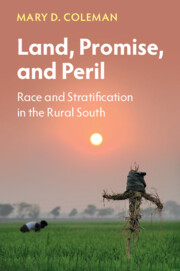Book contents
- Land, Promise, and Peril
- Cambridge Studies in Stratification Economics: Economics and Social Identity
- Land, Promise, and Peril
- Copyright page
- Contents
- Figures
- Tables
- Preface
- Acknowledgments
- Part I The Family in an Intemperate Community, State, and Nation
- 1 Families’ Cross-Century Struggles to Leave Dispossession Behind
- 2 The Sunflower County Delta
- 3 Multigenerational Injury, Insult, and Adversity
- 4 Patterns of Dispossession
- 5 Facing Promise and Peril
- 6 Position-Taking in the Nation
- Part II Family Interiority and Economic Mobility Pathways
- Part III Pathways toward Upward Economic Mobility
- Select Bibliography
- Index
4 - Patterns of Dispossession
from Part I - The Family in an Intemperate Community, State, and Nation
Published online by Cambridge University Press: 15 April 2023
- Land, Promise, and Peril
- Cambridge Studies in Stratification Economics: Economics and Social Identity
- Land, Promise, and Peril
- Copyright page
- Contents
- Figures
- Tables
- Preface
- Acknowledgments
- Part I The Family in an Intemperate Community, State, and Nation
- 1 Families’ Cross-Century Struggles to Leave Dispossession Behind
- 2 The Sunflower County Delta
- 3 Multigenerational Injury, Insult, and Adversity
- 4 Patterns of Dispossession
- 5 Facing Promise and Peril
- 6 Position-Taking in the Nation
- Part II Family Interiority and Economic Mobility Pathways
- Part III Pathways toward Upward Economic Mobility
- Select Bibliography
- Index
Summary
As Powdermaker found, many of the families she examined and all the families in my work—working black poor, landed farmers, and Jack -- professed Christian faith. All were actively engaged in church and all desired marriage. Like the sharecropping poor, the landed Byrd patriarch, the quasi-croppers and the mule-renter’s son highly valued marriage, Christian faith, savings and a comfortable home. Often, the black poor and the non-poor shared the Sunday morning religious spaces, some sang in the same choirs and served on the usher board, not because they were members of the same caste, but because they were first and foremost Americans and Christians---imbued with a sense of American’s promise, not just their own. Faith and faith discourses allied them as a community—as a people—with the nation.
- Type
- Chapter
- Information
- Land, Promise, and PerilRace and Stratification in the Rural South, pp. 62 - 90Publisher: Cambridge University PressPrint publication year: 2023

